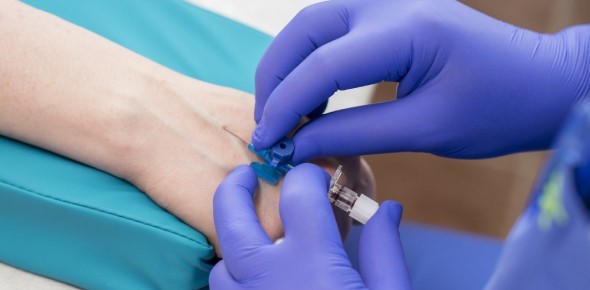A nurse is providing teaching about health promotion activities for a client who has a new diagnosis of type 1 diabetes mellitus. Which of the following statements by the client indicates an understanding of the teaching?
"If I can keep my hemoglobin A1C less than 6.5%, I will be cured of diabetes.".
"I will check my blood sugar level before exercising.".
"I should have my eyes checked every 2 years.".
"I should soak my feet daily in warm, soapy water.".
The Correct Answer is B
Choice A rationale:
The statement "If I can keep my hemoglobin A1C less than 6.5%, I will be cured of diabetes.”. is incorrect. While maintaining an A1C level below 6.5% is a recommended target for some individuals with diabetes, achieving this level does not cure diabetes. Diabetes is a chronic condition that requires ongoing management and lifestyle modifications.
Choice B rationale:
Checking blood sugar levels before exercising is an important aspect of managing type 1 diabetes. Exercise can affect blood glucose levels, and knowing the current level helps the client determine whether it is safe to engage in physical activity or if adjustments to insulin or carbohydrate intake are needed.
Choice C rationale:
Having regular eye checks every 2 years is essential for clients with diabetes, but it is not the best statement that indicates an understanding of health promotion activities for a new diagnosis of type 1 diabetes mellitus.
Choice D rationale:
Soaking feet daily in warm, soapy water is not a recommended practice for clients with diabetes. It can lead to skin dryness and increase the risk of infection. Instead, clients with diabetes should practice daily foot inspections and keep their feet moisturized to prevent complications related to peripheral neuropathy.
Nursing Test Bank
Naxlex Comprehensive Predictor Exams
Related Questions
Correct Answer is C
Explanation
Verify that the client has adequate IV access.

Choice A rationale:
Administering vasopressin to the client might be necessary to manage the hemorrhage, but before any medication administration, it is crucial to ensure the client has adequate IV access. Vasopressin is a vasoconstrictor and can help control bleeding from esophageal varices, but its effectiveness relies on IV access to deliver the medication promptly.
Choice B rationale:
Requesting blood from the blood bank is essential for a client experiencing significant bleeding. However, the priority action is to verify IV access to administer any necessary blood products.
Choice C rationale:
This is the correct choice. Before initiating any interventions, ensuring the client has appropriate IV access is a priority. Adequate IV access is necessary to administer fluids, medications, or blood products promptly and effectively stabilize the client's blood pressure.
Choice D rationale:
Inserting an indwelling urinary catheter is not the priority action in this situation. While monitoring urine output is important, it should be secondary to addressing the client's hypotension and hemorrhage.
Correct Answer is A
Explanation
Choice A rationale:
Properly cutting the opening on the skin barrier wafer to fit over the stoma is crucial to prevent any irritation or damage to the surrounding skin. A well-fitted wafer creates a seal around the stoma, reducing the risk of stool coming into contact with the skin, which can cause excoriation.
Choice B rationale:
Emptying the bag when it is three-fourths full of stool is unrelated to the education on colostomy care. This information was provided in the previous question () and is not relevant to colostomy care education.
Choice C rationale:
The color of the stoma should not be slightly purple. A healthy stoma should be pink or red, indicating a good blood supply. A purple or dark-colored stoma could indicate inadequate blood flow, which is a concern and requires immediate medical attention.
Choice D rationale:
Cleansing the peristomal skin with moisturizing soap and water is not the recommended approach. The nurse should use plain water or mild, non-moisturizing soap to clean the peristomal skin, as moisturizing soap may leave a residue that affects the adhesion of the skin barrier wafer.
Whether you are a student looking to ace your exams or a practicing nurse seeking to enhance your expertise , our nursing education contents will empower you with the confidence and competence to make a difference in the lives of patients and become a respected leader in the healthcare field.
Visit Naxlex, invest in your future and unlock endless possibilities with our unparalleled nursing education contents today
Report Wrong Answer on the Current Question
Do you disagree with the answer? If yes, what is your expected answer? Explain.
Kindly be descriptive with the issue you are facing.
